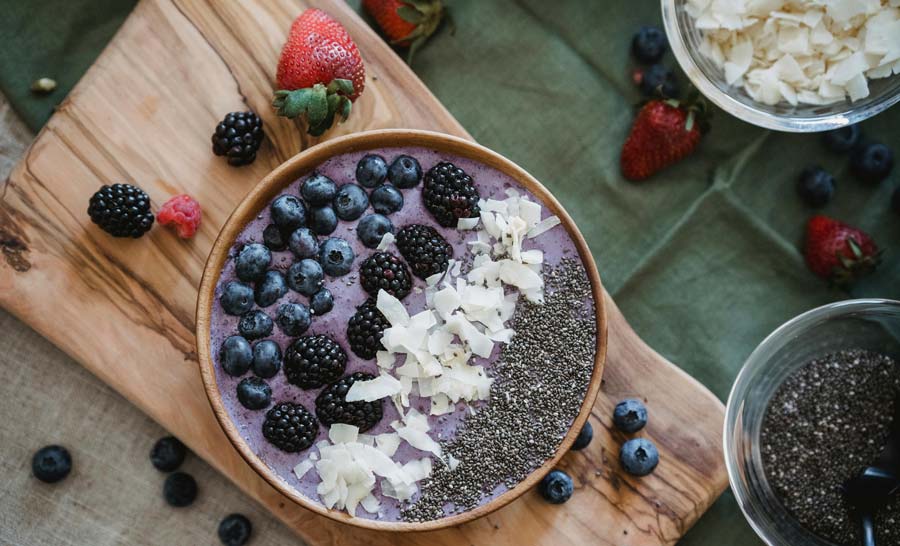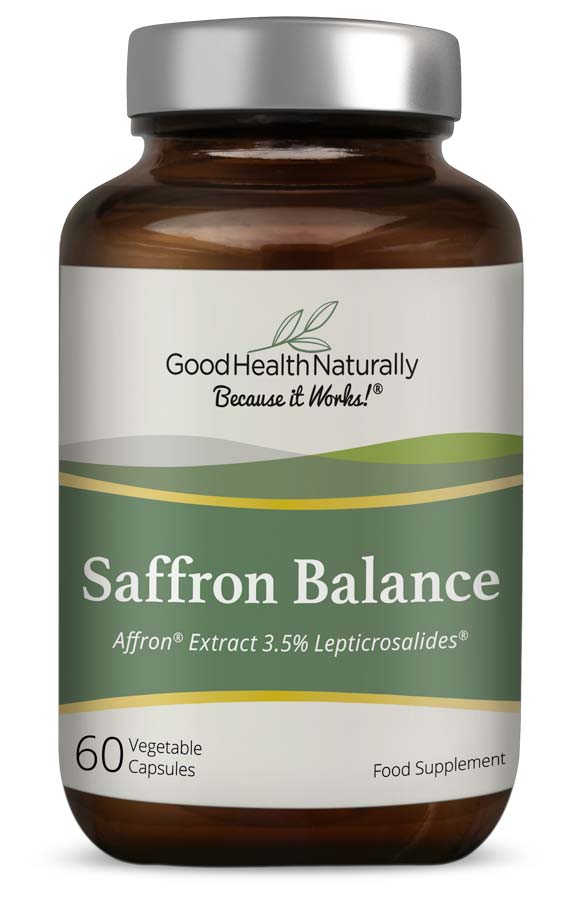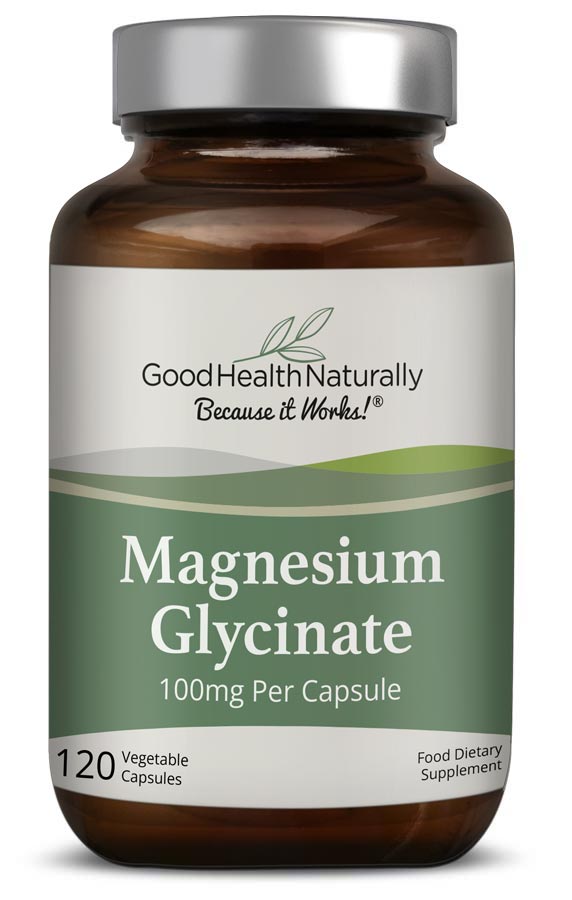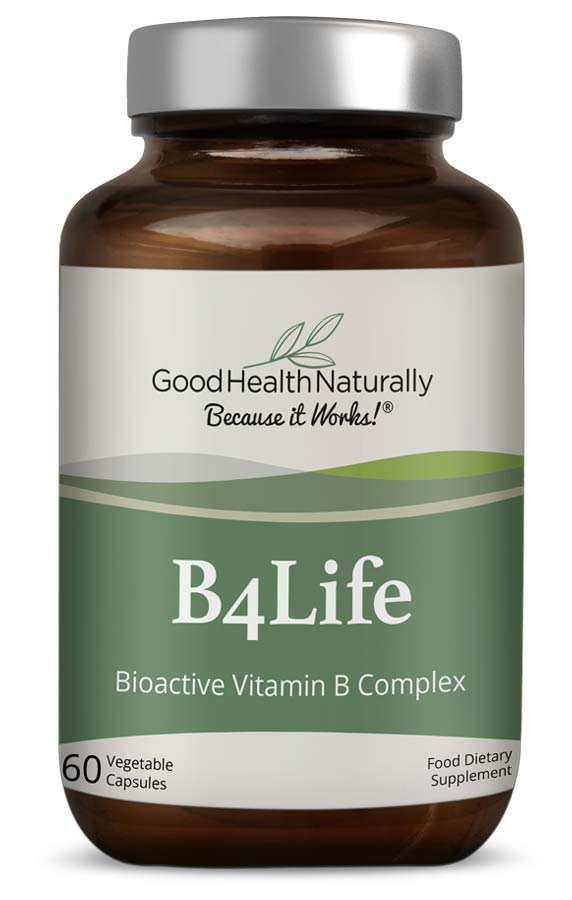Studies show chronic stress can be just as harmful to our health as smoking, obesity or lack of exercise. Research consistently links it to a wide range of mental and physical health issues, including cardiovascular problems, Alzheimer’s Disease and even certain cancers.
While meditation and mindfulness can certainly help, what we eat also plays a surprisingly powerful role in stress management. Certain stress-relieving foods and nutrients can support the nervous system, stabilise mood and help the body cope more effectively.
Quick List: Top 10 Stress-Relieving Foods
If you’re short on time, here are some of the best foods for stress relief to add to your day:
- Salmon and oily fish – rich in omega-3s to balance mood
- Citrus fruits and bell peppers – high in vitamin C for adrenal support
- Wholegrains – steady energy and balanced blood sugar
- Leafy greens – magnesium to relax the nervous system
- Nuts and seeds – rich in B vitamins and minerals
- Berries – antioxidant protection against stress
- Dark chocolate – boosts endorphins naturally
- Green tea – L-theanine for calm focus
- Fermented foods – for a healthy gut–brain connection
- Saffron – the mood-lifting spice backed by research
The Problem with Chronic Stress
We are built to cope with short bursts of stress. Our ancestors wouldn’t have survived without a stress response when facing the threat of wild animals like lions or tigers. Today, even though our modern stresses tend not to be physical threats, we still respond to perceived ‘danger’ with the same automatic reaction known as ‘fight-or-flight.’
Our bodies still prepare to either take on the challenge and ‘attack’ or to run away and ‘escape.’ When stress causes the release of hormones like adrenaline and cortisol, which increase heart and breathing rates, and digestion and repair slow down. Once the threat is dealt with, the body quickly returns to normal. But if stress becomes long-term, our bodies stay in this heightened state.
Imagine constantly pushing your foot on the accelerator, it would wear out the car. Persistent stress will do the same to our bodies, and we can end up with hormone imbalances, high blood pressure, digestive issues and poor immunity.
How Diet Affects Stress Levels
When we’re stressed and busy, we often reach for quick energy boosters like sugary snacks, crisps, coffee or fizzy drinks. However, the brief lift they give us is often followed by a sharp drop in blood sugar levels, which can leave us feeling irritable and even more tired.
Studies show a strong link between diets high in refined, processed carbohydrates and worsening symptoms of mood disorders such as stress and anxiety. In contrast, nutrient-rich whole foods can help reduce stress naturally by balancing hormones, nourishing the brain and promoting calm.
Caffeinated drinks act as stimulants and prompt the adrenal glands to release additional stress hormones. This can lead to insomnia, restlessness or nervousness. Many people also turn to alcohol to relax. While it may have an instant calming effect, over time, it can disrupt sleep and increase anxiety.
Eat to Beat Stress: The Best Stress-Relieving Foods
Eating your way to calm starts with choosing foods that nourish both body and mind. Certain ingredients contain key nutrients that help regulate mood, support the nervous system and keep energy steady throughout the day. Below are some of the best stress-relieving foods to include regularly for greater balance and resilience.
Oily Fish for Omega-3 Calm
Salmon, mackerel, sardines and trout are rich in omega-3 fatty acids, which help regulate mood and reduce inflammation. Studies show omega-3s can lower cortisol during stressful situations. Flaxseeds and walnuts are excellent plant-based alternatives.
Vitamin C for Adrenal Support
The largest store in our bodies is in the adrenal glands, where the stress hormones are made. It’s important to increase vitamin C during times of stress, as research shows people with higher levels of vitamin C tend to be more resilient and able to cope. Good sources include citrus fruits, bell peppers and tomatoes.
B Vitamins for Energy and Nerve Health
Ensure you get plenty of B vitamins by including wholegrain foods, nuts, seeds, avocados, bananas and sweet potatoes. Chronic stress also increases the need for B vitamins. especially B5, B6, and B12. They support our nervous systems and help the body properly absorb energy from our food. They are water-soluble, so you need a daily supply.
Leafy Greens for Brain Protection
Spinach, kale and Swiss chard are loaded with magnesium, a mineral which helps regulate the body’s stress response. Magnesium deficiency can increase feelings of anxiety and irritability. Add a handful of greens to your smoothies, stir-fries or soups.
Nuts and Seeds for Steady Energy
Almonds, sunflower seeds and pumpkin seeds provide a healthy mix of magnesium, zinc and B vitamins. These nutrients support the nervous system and help convert food into energy efficiently. A small handful of nuts or a sprinkle of seeds on oatmeal makes a perfect stress-busting snack.
Fermented Foods for Gut–Brain Balance
An unhealthy gut can affect our resilience to stress. Probiotic-rich foods such as yoghurt, kefir, kimchi, and sauerkraut help maintain a healthy gut microbiome, which can positively influence mood and stress resilience.
Whole Grains for a Stable Mood
Brown rice, quinoa and oats are complex carbohydrates that release energy slowly, helping stabilise blood sugar and prevent energy crashes that can worsen stress and irritability.
Berries for Antioxidant Protection
Blueberries, strawberries, and raspberries are packed with antioxidants that can help combat oxidative stress. Their high vitamin C content also supports adrenal health, which is essential for managing stress hormones effectively. Enjoy them fresh, frozen or blended into smoothies.
Dark Chocolate for a Happy Boost
A little dark chocolate of 70% cocoa or higher can genuinely lift your mood. It stimulates endorphin production, reduces cortisol and improves blood flow to the brain. Stick to a small piece a few times a week.
Green Tea for Calm Focus
Unlike coffee, green tea contains L-theanine, an amino acid which promotes relaxation. It works synergistically with a small amount of caffeine to improve focus while keeping your mind calm and steady. Sip a cup mid-morning or afternoon for gentle stress relief.
Saffron: The Mood-Lifting Spice
Often called the ‘sunshine spice,’ saffron has gained attention for its potential to ease stress and support emotional wellbeing. Rich in active compounds such as crocin and safranal, saffron helps combat oxidative stress, which can contribute to feelings of stress and anxiety. Research also suggests saffron may boost levels of neurotransmitters like serotonin, promoting feelings of calm and positivity.
Simple Ways to Add Stress-Relieving Foods to Your Day
Knowing what to eat is one thing but putting it into practice is where the real change happens. By making small, manageable adjustments to daily meals, it becomes easier to support mood, energy and overall wellbeing without feeling restricted or overwhelmed.
Choose a Mediterranean-Inspired Diet
Perfect for supporting good mental wellbeing. Research shows the risk of depression was up to 35% lower in people eating the Mediterranean diet compared to the traditional ‘Western’ diet.
Balance Blood Sugar with Protein
Including a portion of protein with every meal can help balance blood sugar. Protein is also vital for the body to make enzymes, hormones and other chemicals. Choose legumes, nuts, seeds, organic or grass-fed meats, wild fish or eggs.
Power Up with Healthy Fats
Providing a concentrated source of energy, high-quality fats are crucial building blocks for cell membranes and hormones. Make salad dressings with cold-pressed organic olive oil, and eat oily fish, nuts, seeds and avocados.
Fill Up on Colourful Vegetables and Fruits
Make sure the diet includes plenty of vegetables and fruit every day. Especially broccoli and leafy greens, as these are nutrient-dense, antioxidant-rich, and high in fibre, magnesium and folate.
If there are days when you cannot get all the nutrients your body needs from food alone, consider supporting your diet with targeted supplements.
Formulas providing B vitamins can help support energy and nervous system function, while magnesium contributes to relaxation and normal muscle function. A high-quality krill oil or omega-3 supplement can also help maintain healthy brain and heart function during stressful times. You can even supplement with a Saffron extract to give you extra support when needed.

Easy Everyday Tips
- Start the day with oatmeal topped with berries and chia seeds.
- Snack smart by choosing a handful of almonds instead of processed foods.
- Add colour to meals with leafy greens or roasted vegetables.
- Enjoy balance by pairing lean proteins with whole grains for steady energy.
- Replace one coffee a day with green tea to reduce caffeine overload.
FAQs: Stress-Relieving Foods and Mood Support
What are the best stress-relieving foods?
Some of the most effective stress-relieving foods include oily fish, leafy greens, nuts, seeds, berries, dark chocolate and fermented foods. These provide essential nutrients, such as magnesium, omega-3 fats, and B vitamins, that help the body manage stress naturally.
Can diet really help reduce stress?
Yes, what you eat has a direct impact on your mood and stress response. A nutrient-rich, balanced diet helps stabilise blood sugar, support adrenal function and nourish the nervous system, all of which promote calm and resilience.
Which nutrients are most important for coping with stress?
Key nutrients for stress support include magnesium, vitamin C, B vitamins and omega-3 fatty acids. These work together to regulate stress hormones and support brain and adrenal health.
Are there any foods to avoid when feeling stressed?
Try to limit caffeine, alcohol and refined sugars as they can spike stress hormones, disrupt sleep and affect mood. Instead, choose whole, unprocessed foods that release energy steadily.
How can I include more stress-relieving foods in my day?
Start with small swaps. Add berries to breakfast, snack on nuts and seeds, include leafy greens with lunch or dinner, and replace one coffee a day with green tea for calm focus.
Related Reading
Hidden Burnout Symptoms: How to Spot the Signs and Recover Naturally
Learn how to recognise the early warning signs of burnout and explore natural ways to restore energy, balance hormones and support recovery.
Final Thoughts: Nourish Calm from Within
Choosing nutrient-dense, stress-relieving foods gives your body the tools it needs to cope more effectively with everyday pressures. Combine these dietary habits with good sleep, gentle movement, and mindfulness to naturally ease stress levels and support a happier, calmer mind.
References
https://bmcpublichealth.biomedcentral.com/articles/10.1186/s12889-024-20961-4
https://www.mentalhealth.org.uk/about-us/news/survey-stressed-nation-UK-overwhelmed-unable-to-cope
https://www.ncbi.nlm.nih.gov/pmc/articles/PMC5579396/
https://pubmed.ncbi.nlm.nih.gov/27472404/
https://pubmed.ncbi.nlm.nih.gov/2402180/
https://www.ncbi.nlm.nih.gov/pmc/articles/PMC2775419/
https://pubmed.ncbi.nlm.nih.gov/22314561/
https://pubmed.ncbi.nlm.nih.gov/14522731/
https://www.ncbi.nlm.nih.gov/pmc/articles/PMC6770181/
https://pmc.ncbi.nlm.nih.gov/articles/PMC7882499/







